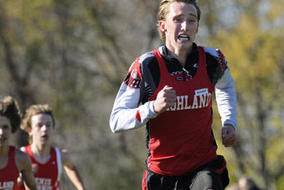I originally wrote about this last April, but I think it's worth revisiting, especially as athletes head into winter training.
Triathlon can get fancy and complicated in a hurry, with three sports, too many toys and gadgets, and new "secret" training methods in magazines or internet forums every week. After spending time and talking with a variety of coaches over the past few years, and through a bit of trial and error, I've moved in the direction of keeping things simple, with good results. One of the simplest principles that coaches and athletes can adhere to is:

As I wrote back in April, this idea came up on the pool deck one day with NTC coaches Neil Harvey and Patrick Kelly. It's something most of us intuitively know, but it seems to be rarely followed. Put simply, athletes have to be healthy (free from illness and serious injury) before they can train consistently, and they need to be training consistently before they concern themselves with performance (hard training, or racing). With the typical fall cold/flu season upon us, and a variety of racing opportunities through the fall and winter, it's common to see athletes chase performances in between bouts of illness, compromising their summer performances.
We did a fairly good job of sticking to this philosophy last year with the PTC squad, with some exceptions. In the one instance where we drifted away from our principles, we ended up with a predictable outcome: prolonged illness, compromised training, and reduced performance. It's not always easy to reschedule training, scratch races, or reduce training load; athletes don't like it, and coaches generally don't either. But the alternative is almost always worse.
Coaches and athletes who prioritize summer (triathlon) performances over 'off-season' results, and commit to health and consistency before performance, give themselves the best chance of improved performance in the short term (next summer) and long term (multiple seasons). Athletes and coaches who place a premium on the next race or training session, without considering the bigger picture, are likely to repeat the injury and illness patterns of previous years and wonder why their performance has plateaued.
Life will keep teaching you the same lessons until you learn them. The majority of athletes will repeat the mistakes of last year, and end up with inconsistent training and compromised performance next year. Those who adhere to the simple "health --> consistency --> performance" model will give themselves the best chance of improved performance next season. It should be clear to any athlete which position they want to be in when they stand on the start line next summer. The hard part is living by this model, but it's worth the effort. Start today.
Triathlon can get fancy and complicated in a hurry, with three sports, too many toys and gadgets, and new "secret" training methods in magazines or internet forums every week. After spending time and talking with a variety of coaches over the past few years, and through a bit of trial and error, I've moved in the direction of keeping things simple, with good results. One of the simplest principles that coaches and athletes can adhere to is:

As I wrote back in April, this idea came up on the pool deck one day with NTC coaches Neil Harvey and Patrick Kelly. It's something most of us intuitively know, but it seems to be rarely followed. Put simply, athletes have to be healthy (free from illness and serious injury) before they can train consistently, and they need to be training consistently before they concern themselves with performance (hard training, or racing). With the typical fall cold/flu season upon us, and a variety of racing opportunities through the fall and winter, it's common to see athletes chase performances in between bouts of illness, compromising their summer performances.
We did a fairly good job of sticking to this philosophy last year with the PTC squad, with some exceptions. In the one instance where we drifted away from our principles, we ended up with a predictable outcome: prolonged illness, compromised training, and reduced performance. It's not always easy to reschedule training, scratch races, or reduce training load; athletes don't like it, and coaches generally don't either. But the alternative is almost always worse.
Coaches and athletes who prioritize summer (triathlon) performances over 'off-season' results, and commit to health and consistency before performance, give themselves the best chance of improved performance in the short term (next summer) and long term (multiple seasons). Athletes and coaches who place a premium on the next race or training session, without considering the bigger picture, are likely to repeat the injury and illness patterns of previous years and wonder why their performance has plateaued.
Life will keep teaching you the same lessons until you learn them. The majority of athletes will repeat the mistakes of last year, and end up with inconsistent training and compromised performance next year. Those who adhere to the simple "health --> consistency --> performance" model will give themselves the best chance of improved performance next season. It should be clear to any athlete which position they want to be in when they stand on the start line next summer. The hard part is living by this model, but it's worth the effort. Start today.
































